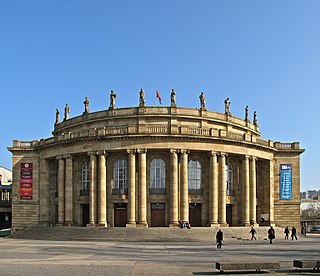
The Hamburg State Opera is a German opera company based in Hamburg. Its theatre is near the square of Gänsemarkt. Since 2015, the current Intendant of the company is Georges Delnon, and the current Generalmusikdirektor of the company is Kent Nagano.

The Staatsoper Stuttgart is a German opera company based in Stuttgart, the capital of Baden-Württemberg, Germany. The Staatsorchester Stuttgart serves as its resident orchestra.

The Staatstheater Stuttgart is a theatre with three locations, Oper Stuttgart, Stuttgarter Ballett, and Schauspiel Stuttgart, in Stuttgart, Germany. The state that its name refers to is Baden-Württemberg.

The Philharmonisches Staatsorchester Hamburg is an internationally renowned symphony orchestra based in Hamburg. As of 2015, Kent Nagano has been General Music Director (Generalmusikdirektor) and chief conductor (Chefdirigent). The Hamburg Philharmonic State Orchestra also serves as the orchestra of the Hamburg State Opera. The orchestra is one of three major orchestras in Hamburg, the others being the Hamburger Symphoniker and the NDR Elbphilharmonie Orchestra.

Volker David Kirchner was a German composer and violist. After studies of violin and composition at the Peter Cornelius Conservatory, the Hochschule für Musik Köln and the Hochschule für Musik Detmold, he worked for decades as a violist in the Radio-Sinfonie-Orchester Frankfurt. He was simultaneously the violist in the Kehr Trio founded by his violin teacher Günter Kehr, and a composer of incidental music at the Hessisches Staatstheater Wiesbaden.

The Staatstheater Nürnberg is a German theatre company in Nuremberg, Bavaria. The theatre is one of four Bavarian state theatres and shows operas, plays, ballets and concerts.

The Hessisches Staatstheater Wiesbaden is a German theatre located in Wiesbaden, in the German state Hesse. The company produces operas, plays, ballets, musicals and concerts on four stages. Known also as the Staatstheater Wiesbaden or Theater Wiesbaden, its orchestra is the Hessisches Staatsorchester. The building was inaugurated in 1894.

Theater Freiburg is a theatre in Baden-Württemberg, Germany.

The Philharmonisches Staatsorchester Mainz, is the resident orchestra of the Staatstheater Mainz. In addition to musical theatre and Tanztheater, youth symphony and chamber concerts are part of the activity of the orchestra. It is one of the three state symphony orchestras of Rhineland-Palatinate. Since September 2011, Hermann Bäumer has been principal conductor.

The Staatstheater Darmstadt is a theatre company and building in Darmstadt, Hesse, Germany, presenting opera, ballet, plays and concerts. It is funded by the state of Hesse and the city of Darmstadt. Its history began in 1711 with a court theatre building. From 1919 it was run as Landestheater Darmstadt. The present theatre was opened in 1972 when the company was named Staatstheater.

The Brandenburgisches Staatsorchester Frankfurt or BSOF is a symphony orchestra based in Frankfurt (Oder) in Germany. It is the orchestra of the state of Brandenburg. From 2007 to 2019 its leader has been Howard Griffiths. Since 2019 the orchestra is under the leadership of Jörg-Peter Weigle.
Karl Maria Zwißler was a German conductor, and academic. He was for decades the Generalmusikdirektor and Intendant of the Staatstheater Mainz. He taught conducting at the music universities of Stuttgart and Frankfurt.
Catherine Rückwardt is a German pianist and conductor. She was Generalmusikdirektorin of the Staatstheater Mainz from 2001 to 2011, and has worked freelance since that time.
Wilfried Hanke was a German violinist and music educator.

The Philharmonische Staatsorchester Halle was a symphony orchestra in Halle that existed from 1946 to 2006, which functioned as a concert orchestra and was last predominantly supported by the Land of Saxony-Anhalt. As a result of the fusion with the Orchester des Opernhauses Halle, the Orchestra was merged into the Staatskapelle Halle in 2006.
Heribert Esser is a German conductor and academic teacher. In 1962–1986, he held the position of director of music at Braunschweig, and the Elder Chair of Music at the Elder Conservatorium of Music of the University of Adelaide, South Australia, from 1987 to 1994. Most recently he conducted the Philharmonisches Staatsorchester Halle.

The Norddeutsche Philharmonie Rostock, based in Rostock, Mecklenburg-Vorpommern, Germany, is the state's largest symphony orchestra and also the orchestra of the Volkstheater Rostock. Founded in 1897, the orchestra grew to 90 musicians by 1991. They were rewarded a prize for ambitious programs in 1993.

The Theater Trier is the municipal theatre of Trier, Rhineland-Palatinate, offering opera and musical, dance and drama. The company dates back to 1802. The current house was completed in 1964, and needs renovation. The director (Intendant) since 2018 is Manfred Rolf Langner
Alexander Steinitz is an Austrian conductor and since 2018 first Kapellmeister of the Theatre of West Pomerania.
Garrett Keast is an American conductor of symphony orchestra, opera, and ballet and founder of the Berlin Academy of American Music (BAAM).


















